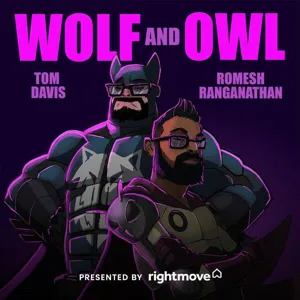Podcast Summary
A man with a brain injury unlocks hidden musical talents: A severe head injury caused amusia, leaving Derek unable to recognize music, but it also unlocked his unique ability to compose and play beautiful piano melodies
Even without formal training, Derek Amato, a man with a condition called quiet savant syndrome, was able to compose and play piano beautifully after suffering a traumatic brain injury. Growing up, Derek was an athletic kid with a musical interest but no formal training. He enjoyed accompanying his grandmother, an organ player, during church services. However, it wasn't until a severe head injury in 2006 that Derek discovered his unique musical abilities. After the injury, he began to compose and play piano, creating intricate and beautiful melodies. The injury, which caused a condition called amusia, left him unable to recognize or understand music, but it also unlocked his own musical talents. The injury forced him to listen to music in a new way, and he was able to translate those sounds into piano compositions. Despite the challenges he faced, Derek's musical abilities continued to develop, demonstrating the incredible potential of the human brain to adapt and create in unexpected ways.
Unexpected talent discovered through new experience: Be open to new experiences and trust the unknown, you might discover hidden talents and emotions.
Unexpected experiences can lead to profound discoveries about ourselves. The speaker, who had never played the piano before, was drawn to an old keyboard and, after sitting down to play, was suddenly able to create beautiful, classical music. This unexpected talent left the speaker feeling both exhilarated and scared, as she wondered how to share this newfound ability with those closest to her. The experience also highlighted the importance of being open to new experiences and trusting the unknown, as the speaker's curiosity and willingness to try something new led to a deeply moving and emotional moment.
Unexpected experiences can lead to profound discoveries: Embrace unexpected moments and discover new passions, as they may lead to meaningful connections and personal growth
Sometimes unexpected experiences can lead to profound discoveries about ourselves. Derek shared a story about taking his mother to a music store, where he showed her a digital piano and ended up playing for her. The emotional connection they shared during this moment was so powerful that it led Derek to a newfound passion for playing the piano. Initially, he was skeptical and questioned if this skill was temporary, but as time passed, he accepted and embraced his new talent. This experience taught Derek to appreciate the beauty and unpredictability of life and to make the most of every moment. It's important to remember that sometimes the most meaningful experiences come from the most unexpected places.
A man's transformation in musical ability sparks curiosity about the brain's potential: Despite skepticism, a man's belief in his unexplained musical growth highlights the brain's intriguing capabilities and the importance of ongoing research.
The human brain is a complex and largely mysterious organ, capable of remarkable feats and unexpected changes. The individual in this conversation, who has experienced a profound shift in musical ability, offers a unique perspective on the brain's potential. Despite facing skepticism from medical professionals, he remains convinced that his experiences are genuine and that they are part of a larger, predetermined path for him. The conversation highlights the intrigue and fascination surrounding the brain's capabilities, as well as the ongoing challenges in understanding its complexities. The individual's unwavering faith and positive attitude serve as a reminder of the human spirit's resilience and adaptability. Ultimately, the conversation underscores the importance of continued exploration and research into the mysteries of the brain and the human condition.
Extraordinary abilities from brain overload: While brain injuries can lead to remarkable talents, researchers question if the risks of damaging the brain outweigh the benefits.
The human brain, when pushed beyond its limits, can lead to extraordinary abilities, but it also comes with potential risks. Derek Amato, a man with quiet savant syndrome, experienced a profound change after a head injury, gaining musical talent. However, his story raised questions about the implications of such abilities, as some researchers believe these talents could be a result of the brain overworking and potentially damaging itself. Dr. Darrell Trevor, a psychiatrist who studied Derek, noted that while such cases are jarring, they are not unheard of in the field of savant syndrome. It's essential to consider the long-term consequences of these abilities and whether the benefits outweigh the potential risks.
The Story of Derek Ambler, a Savant with Extraordinary Musical Abilities: We all have unique gifts and abilities, and the story of Derek Ambler inspires us to discover and excel in our passions, while recognizing the value of effortless learning.
Our brains have inherent abilities that we may not be aware of, and these abilities can manifest in extraordinary ways, such as in the case of savants. The discussion highlights the story of Derek Ambler, a savant who acquired his exceptional musical abilities after a head injury. The injury led to a left-brain injury with right-brain compensation, which is common in Savant Syndrome. This compensation often results in skills related to art, music, and mathematics, which involve pattern recognition. Cognitive psychologist Scott Barry Kaufman explains that we may come hardwired for certain kinds of activities, and many things we learn in life are not deliberate but rather effortless. Our brains have structures that help us learn, and these skills often feel like fun rather than a chore. Savants, however, demonstrate effortless learning in domains that typically require sustained effort. The takeaway is that we all have unique gifts and abilities, and we may not even realize it. The story of Derek Ambler offers inspiration and hope that we can all find our vehicle to sing, or discover our passions and excel in them. Additionally, the discussion emphasizes the importance of recognizing the value of effortless learning and the role it plays in our lives.
Navigating through interconnected musical walls: Exploring and engaging with complex music involves focusing on distinct patterns and flows in different sections, leading to new discoveries and appreciation for its depth.
Derek Amato, a musician, describes his experience of engaging with a complex piece of music as navigating through a series of interconnected walls or blocks, each with distinct patterns and flows. These walls represent different sections of the music, and moving between them requires focus and attention. Amato's description highlights the intricacy and depth of the musical composition, and his excitement lies in discovering new patterns and flows within it. He has not played this specific piece before, and each wall could represent a new composition or a different interpretation of the same music. This metaphorical representation of music as a physical space emphasizes the importance of exploration and engagement in fully appreciating its complexity.





